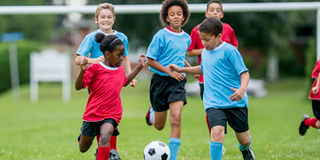Prime
Why you should interest your child in competitive sports

Sports breaks social barriers and teaches children to value others.
PHOTO/NET
What you need to know:
Parents ought to interest their children in sports at a competitive level. Make learning a sport fun, whether they win or lose, so they can tap into the benefits of sport for their mental, emotional and physical well-being
Last holiday, Betty, a mother of two boys; John, four, and Jack, seven, enrolled them into a football academy near their home in Kiira. She had to get them soccer kits (shoes, stockings, balls, and jerseys) first and get them and herself into the routine of going for practice from 4pm to 6pm every day.
At the start, it was a drag for her trying to coordinate their transport, school runs work, and beat the traffic. She also needed mental energy to be present with the mind, body, and soul in order to watch her boys play and cheer them on.
They slowly got the hang of it and by the fourth week, they were pestering her about going to the football academy every afternoon.
“Their social skills and confidence have greatly improved. They can have conversations and easily make friends, especially for Jack who has been very introverted. They are now bubbly and positive in doing house chores,” says Betty.
She says sport has become important for her boys that she is optimistic they will play professional football and represent their country if they stay on course. “If they choose football as a profession, I will not have a problem with it,” she says with an air of a satisfied parent.
There are more than 300 sports academies in Uganda that would potentially benefit many children. The majority of these though focus on football for an obvious reason; football is the most popular sport in the country. Sport, in general, has several health and life benefits for children and if you are looking for some, here they are:
Keeps body and mind healthy
Research shows that sport protects the heart against diseases such as coronary heart disease because it improves blood circulation, reduces cholesterol and keeps the person away from obesity.
Sports enhances mortar skills
According to Paul Muyimbo, a certified swimming teacher and water aerobics instructor at Lake Victoria Swimming Club Entebbe, swimming is an exercise that one can do even when they are 80 years because it exerts zero impact on the body’s joints and maintains muscle mass.
Brain development
Table tennis, chess and other board games are good brain tonics. “Table tennis (or Ping Pong) improves mental alertness, tactical thinking skills, helps in brain development, improves logical thinking, boosts memory, imagination, intelligence, concentration, patience and teamwork,” says Monica Kisakye, a former Uganda National team player, currently a coach and an international Umpire.
Sports enhance artery function, body immunity by stimulating the circulation of immune cells in the body, thereby protecting children from bacterial and viral infections. Regular sporting activities keep some non-communicable diseases such as cancers, diabetes, and cardiovascular diseases at bay.
Sport teaches character
Players on the same team must strategise to win a game and this means they will inevitably have to appreciate being a team, listen to instructions from their coach, cooperate, be patient and respectful to each other and buffer each other’s weaknesses in order to succeed. Sport, therefore, teaches teamwork, respect for authority and others, strategy, discipline and responsibility; life lessons that will help a child navigate life’s challenges.
Irene Nakalembe, the seven-time Entebbe Ladies Open winner and professional golfer says golf teaches children character. “Unlike other sports where an umpire or referee is required to be present to arbitrate from start to finish, in golf, the player calls penalties on themselves and reports their work (except at the highest level of competition,” she says.
Breaks social barriers
Sport, because of the involvement of others, teaches children to value others. It brings people from different nationalities, cultures, and religious beliefs together in competition. For instance, when we go to Namboole to watch the Uganda Cranes play against another country, we go as Ugandans and not as Baganda or Banyoro or whatever tribe we come from. Therefore, from sport, children can learn early on to appreciate the collective unity that we call humanity.
Channels energy
Children can have untapped energy and sports helps channel this energy productively. Otherwise, a child might want to express it by getting involved in destructive vices such as violence, drugs and alcohol.
Possible future career path
Sports is now branded as a major profession that pays handsomely. A child can turn it into a career-earning prospect like any other and for good reasons. The global sports market today is worth between $480 billion-$620 billions, according to a recent Kearney study of sports teams, leagues and federations.
Sports icons are raking in obscene money other professions can only dream of. For instance, between May 1, 2021 and May 1, 2022, the top earner in sport was Lionel Messi (football) $130 million. If these figures do not encourage you to take sport for your child seriously, nothing else will.
Some academies and schools provide student bursaries for less privileged children because of their sporting talents.




